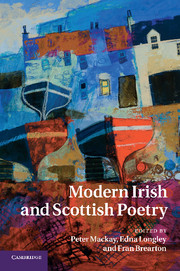Book contents
- Frontmatter
- Contents
- List of contributors
- Acknowledgements
- Introduction
- 1 Swordsmen: W. B. Yeats and Hugh MacDiarmid
- 2 Tradition and the individual editor: Professor Grierson, modernism and national poetics
- 3 Louis MacNeice among the islands
- 4 Townland, desert, cave: Irish and Scottish Second World War poetry
- 5 Affinities in time and space: reading the Gaelic poetry of Ireland and Scotland
- 6 Contemporary affinities
- 7 The Classics in modern Scottish and Irish poetry
- 8 Translating Beowulf: Edwin Morgan and Seamus Heaney
- 9 Reading in the gutters
- 10 ‘What matters is the yeast’: ‘foreignising’ Gaelic poetry
- 11 Outside English: Irish and Scottish poets in the East
- 12 Names for nameless things: the poetics of place names
- 13 Desire lines: mapping the city in contemporary Belfast and Glasgow poetry
- 14 ‘The ugly burds without wings’?: reactions to tradition since the 1960s
- 15 ‘And cannot say / and cannot say’: Richard Price, Randolph Healy and the dialogue of the deaf
- 16 On ‘The Friendship of Young Poets’: Douglas Dunn, Michael Longley and Derek Mahon
- 17 ‘No misprints in this work’: the poetic ‘translations’ of Medbh McGuckian and Frank Kuppner
- 18 Phoenix or dead crow? Irish and Scottish poetry magazines, 1945–2000
- 19 Outwith the Pale: Irish–Scottish studies as an act of translation
- Guide to further reading
- Index
- References
Introduction
Published online by Cambridge University Press: 18 April 2011
- Frontmatter
- Contents
- List of contributors
- Acknowledgements
- Introduction
- 1 Swordsmen: W. B. Yeats and Hugh MacDiarmid
- 2 Tradition and the individual editor: Professor Grierson, modernism and national poetics
- 3 Louis MacNeice among the islands
- 4 Townland, desert, cave: Irish and Scottish Second World War poetry
- 5 Affinities in time and space: reading the Gaelic poetry of Ireland and Scotland
- 6 Contemporary affinities
- 7 The Classics in modern Scottish and Irish poetry
- 8 Translating Beowulf: Edwin Morgan and Seamus Heaney
- 9 Reading in the gutters
- 10 ‘What matters is the yeast’: ‘foreignising’ Gaelic poetry
- 11 Outside English: Irish and Scottish poets in the East
- 12 Names for nameless things: the poetics of place names
- 13 Desire lines: mapping the city in contemporary Belfast and Glasgow poetry
- 14 ‘The ugly burds without wings’?: reactions to tradition since the 1960s
- 15 ‘And cannot say / and cannot say’: Richard Price, Randolph Healy and the dialogue of the deaf
- 16 On ‘The Friendship of Young Poets’: Douglas Dunn, Michael Longley and Derek Mahon
- 17 ‘No misprints in this work’: the poetic ‘translations’ of Medbh McGuckian and Frank Kuppner
- 18 Phoenix or dead crow? Irish and Scottish poetry magazines, 1945–2000
- 19 Outwith the Pale: Irish–Scottish studies as an act of translation
- Guide to further reading
- Index
- References
Summary
CHANGING THE AXIS
To compare modern Irish and Scottish poetry is to change the critical axis. It is to unsettle categories like the ‘English lyric’ or ‘Anglo-American modernism’. We might begin with two Irish-Scottish poetic encounters a century apart. The Rhymers' Club, which foregathered in 1890s London, laid crucial foundations for modern poetry in English, and established the prototype for later avant-garde coteries. The club's make-up was strikingly ‘archipelagic’: a term that will recur in this introduction. The Rhymers' Club marks a space where literary and cultural traditions from different parts of the British Isles came into play; where late nineteenth-century aestheticism met Celticism; and, more materially, where Irish, Scottish and Welsh poets competed for metropolitan attention – W. B. Yeats with particular success. In ‘The Tragic Generation’ (1922), his memoir of the 1890s, Yeats recalls how he once out-manoeuvred the Scottish poet John Davidson:
An infallible Church, with its Mass in Latin and its mediaeval philosophy, and our Protestant social prejudice, have kept [Ireland's] ablest men from levelling passions; but Davidson with a jealousy which may be Scottish, seeing that Carlyle had it, was quick to discover sour grapes. He saw in delicate, laborious, discriminating taste an effeminate pedantry, and would, when that mood was on him, delight in all that seemed healthy, popular, and bustling … He, indeed, was accustomed … to describe the Rhymers as lacking in ‘blood and guts’, and very nearly brought us to an end by attempting to supply the deficiency by the addition of four Scotsmen … […]
- Type
- Chapter
- Information
- Modern Irish and Scottish Poetry , pp. 1 - 19Publisher: Cambridge University PressPrint publication year: 2011
References
- 13
- Cited by

